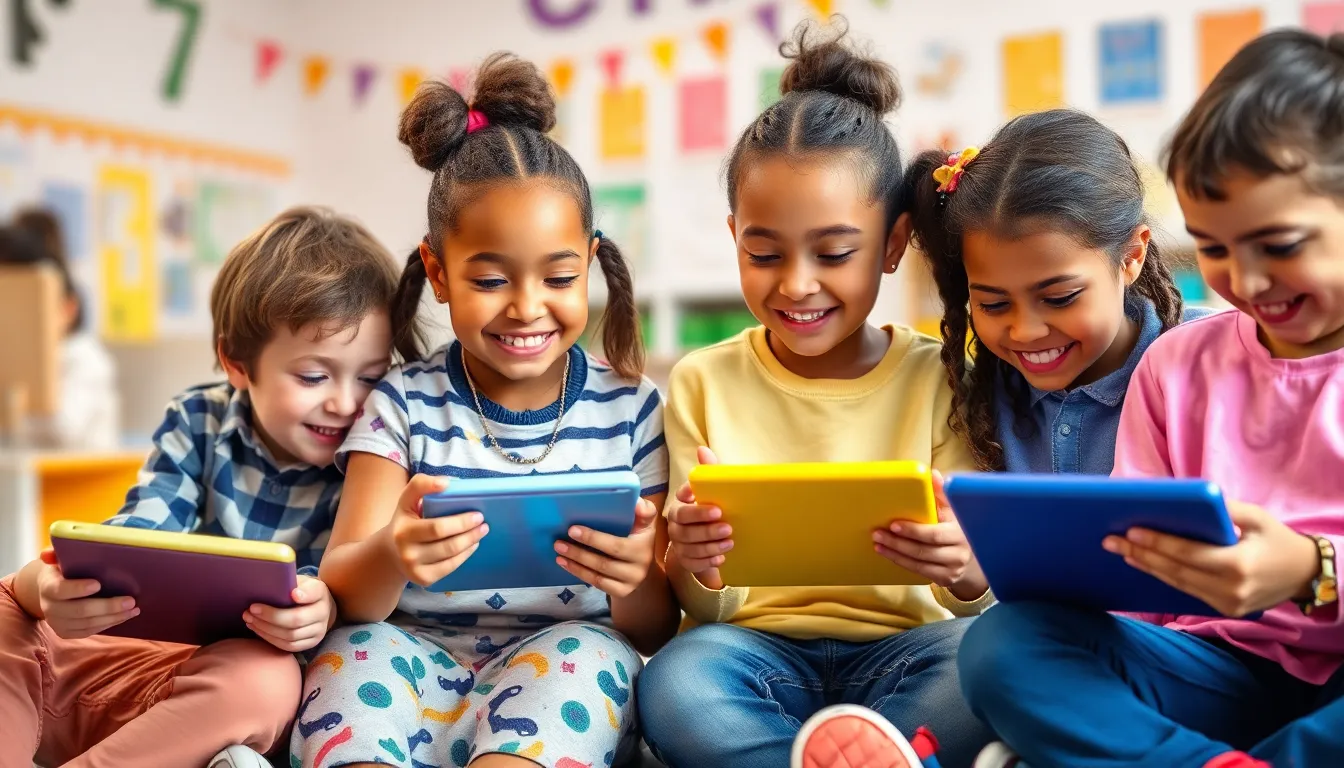In a world where everyone’s glued to their screens, why not make those screens work for special needs education? Educational apps are like the Swiss Army knives of learning tools, packed with features that can turn challenges into triumphs. They’re not just for kids who ace math; they’re designed to engage, motivate, and empower learners of all abilities.
Table of Contents
ToggleOverview of Educational Apps for Special Needs
Educational apps designed for special needs enhance the learning experience for diverse learners. These applications offer individualized approaches, catering to unique challenges faced by students. Features often include interactive activities, visual aids, and customizable settings that adapt to each user’s requirements.
Many of these apps focus on key skills, such as communication, social interaction, and academic subjects. They engage users through gamified elements, which motivate learners to participate actively. For instance, some apps incorporate rewards systems to celebrate progress, reinforcing positive behavior.
Accessibility remains a significant priority for app developers. Many programs include options for text-to-speech, alternative input methods, and adjustable font sizes. Significant research shows that these features promote inclusivity and support a wide range of learning styles.
Collaboration between educators, therapists, and caregivers often influences the app design process. Many apps undergo trials in classrooms and therapy settings to ensure effectiveness. Feedback from these stakeholders shapes the development, allowing for continuous improvement based on real-world use.
The landscape of educational apps evolves rapidly, driven by advancements in technology and increasing awareness of special needs education. Many organizations advocate for using these apps as part of a comprehensive educational strategy. This holistic approach recognizes that specialized resources empower all learners to achieve academic goals while fostering independence and self-confidence.
Benefits of Educational Apps

Educational apps offer substantial benefits for learners with special needs. These tools cater to individual learning styles and challenges, significantly enhancing educational experiences.
Enhanced Learning Experience
Personalized learning paths create an effective environment for diverse learners. Dynamic content delivery and visual aids reinforce understanding. Features like interactive activities and customizable settings facilitate skill acquisition. Many educational apps address communication and social skills alongside academic subjects. Integration of gamified elements provides immediate feedback, allowing students to track progress and celebrate achievements. Growth occurs when students engage with material tailored to their specific requirements.
Increased Engagement
Higher engagement levels result from the interactive nature of educational apps. Users often find colorful graphics and sound effects stimulating. Motivation thrives in environments where learners can earn rewards for completing tasks. Frequent updates and new challenges maintain interest, preventing boredom. Features that allow for collaboration with peers enhance social interaction, further enriching the learning experience. Apps consistently grab attention, encouraging active participation and sustained focus.
Types of Educational Apps
Educational apps for special needs encompass various types, each designed to meet unique learning requirements. These tools play vital roles in enhancing educational experiences and skills development.
Communication Tools
Communication tools facilitate interaction for learners with speech and language challenges. Apps often include features like speech-to-text and customizable voice outputs. Many leverage visual symbols and pictures to enhance understanding. Users can also find augmented and alternative communication options within these apps, promoting effective expression. Engaging activities enable students to practice conversational skills and social interactions in safe environments.
Learning Games
Learning games capture the interest of students through fun and interactive ways to develop cognitive skills. Gamified experiences often motivate learners, encouraging participation in subjects like math and reading. Many apps adapt to individual learning paces, allowing users to progress at their comfort. These games frequently incorporate rewards systems, reinforcing positive engagement. Designed for inclusive education, they can also enhance critical thinking and problem-solving abilities in enjoyable formats.
Visual Supports
Visual supports provide essential reinforcement in the learning process for diverse learners. Apps often include images, diagrams, and videos to aid comprehension and retention. Many offer customizable visual schedules that help students organize tasks and routines. By incorporating engaging graphics, these apps captivate attention and streamline information processing. Additionally, visual supports can simplify complex concepts, making learning more accessible and fostering independence in various activities.
Popular Educational Apps for Special Needs
Numerous educational apps enhance learning experiences for individuals with special needs. Below are three prominent apps, each designed to address specific challenges and promote educational engagement.
App 1: Overview and Features
“Proloquo2Go” simplifies communication for non-verbal and limited verbal individuals. This app utilizes symbols and text-to-speech functions to facilitate interaction. Features include customizable vocabulary and dynamic sentence building, allowing users to express thoughts effectively. An engaging interface and built-in vocabulary options cater to diverse age groups and needs. Regular updates ensure continuous improvement based on user feedback and technological advancements, reinforcing its role as a vital communication tool.
App 2: Overview and Features
“Endless Alphabet” engages young learners through interactive vocabulary-building activities. This app incorporates vibrant visuals and lovable characters to capture attention while teaching phonetics and word meanings. The application promotes cognitive development via fun animations and sound effects. With its user-friendly design, children can explore words at their own pace, ensuring individualized learning experiences tailored to their unique requirements. Regular updates keep content fresh, enhancing user engagement and skill acquisition.
App 3: Overview and Features
“Autism iHelp” supports social skills development with a focus on understanding emotions and social cues. This app features a library of visual aids and social stories to illustrate everyday situations. Interactive quizzes and games enhance comprehension, allowing users to practice crucial skills in real-world contexts. Customizability is a core aspect, enabling caregivers to adjust settings to match individual needs. Ongoing updates expand content and functionality, promoting engagement and effective learning strategies tailored to users on the autism spectrum.
Tips for Choosing the Right Educational App
Choosing an educational app for special needs requires careful consideration. Evaluating specific individual needs can lead to better learning outcomes.
Assessing Individual Needs
Identifying unique challenges aids in selecting appropriate apps. Consider personal preferences and learning styles to determine compatibility. Involve educators and therapists for insights into effective tools suited to specific requirements. Create a list of essential features, such as communication aids or visual supports, important for meeting educational goals. Ensure the app aligns with particular strengths and weaknesses, fostering engagement. Such detailed assessment significantly improves the likelihood of success and helps learners thrive.
Considering User Reviews
Reading user reviews provides valuable insights into app effectiveness. Users often share detailed experiences that highlight both strengths and weaknesses. Look for feedback relevant to special needs to gauge how well the app meets diverse learning requirements. Examine patterns in user comments, as they can point to common issues or standout features. Trustworthy reviews from parents, educators, and therapists make informed decisions easier. Prioritize apps with a solid reputation for supporting learners, confirming their suitability in the educational journey.
Educational apps for special needs are revolutionizing the way learners engage with their education. By providing tailored experiences that address individual challenges, these tools empower students to thrive academically and socially. The integration of interactive features and customizable settings fosters a sense of independence and confidence.
As technology continues to advance, the potential for these apps to enhance learning experiences will only grow. Caregivers and educators must remain proactive in selecting the right tools, ensuring they meet the specific needs of each learner. With the right educational apps, individuals with special needs can unlock their full potential and achieve meaningful success in their educational journeys.








